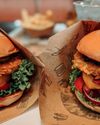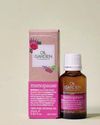
Artist Cat Jones is best known for merging the art and plant science worlds, working in collaboration with neuroscientists, physiotherapists, biologists and botanists to create performative art.
While it may seem like an odd pairing to some, working in both worlds is inherent for Jones, who grew up surrounded by nature and with art and science featuring strongly throughout her childhood.
After living in Papua New Guinea for several years, Jones and her family moved to Queensland, spending much time outdoors, on the road, visiting creeks, swimming in rivers and working on farms.
"That is very much part of my identity: closeness to nature," Jones says. "It's very present when you live up north [in Australia]." Her mum has always been a keen gardener and would create "magic with plants wherever they lived. "She's created these mini rainforests in conditions that aren't necessarily rainforest conditions - yet she seemed to be able to manage it." Similarly, science was always of interest and a central part of family discussions.
Today, one of Jones' sisters works in health and environmental science, and another is a marine biologist.
The artist distinctly remembers attending a university open day, where her sister was part of a demonstration at a laboratory theatre. It was unlike the usual music and drama theatres she had spent time in, and she was fascinated by the room and set-up.
"It was a very simple demonstration, but it resulted in this giant explosion and the formation of an object," Jones recalls. "The theatre, the way it was set up, was so performative. It was so spectacular. It elicited this incredible roar from the audience.
"I immediately saw the spectacular part that science can be. It drove this sense of curiosity after the event, and I think that's something that has carried through into the work that I make, especially because I keep remembering that love."
この記事は WellBeing の Issue 204 版に掲載されています。
7 日間の Magzter GOLD 無料トライアルを開始して、何千もの厳選されたプレミアム ストーリー、9,000 以上の雑誌や新聞にアクセスしてください。
すでに購読者です ? サインイン
この記事は WellBeing の Issue 204 版に掲載されています。
7 日間の Magzter GOLD 無料トライアルを開始して、何千もの厳選されたプレミアム ストーリー、9,000 以上の雑誌や新聞にアクセスしてください。
すでに購読者です? サインイン

YOGA FOR IMPERFECTION
Life is messy and we all make mistakes, but by embracing imperfection, we can begin to accept all parts of ourselves.

Creating the foundations of ritualist self-care
As a busy mum of a three-year-old and expecting another baby, finding time for self-care often feels like a luxury.

Are you doom spending?
If \"doom spending\" has become your go-to for coping with stress, you could be making withdrawals from not just your bank account, but your health too.

THE POWER OF music
Most of us enjoy music. But science shows music is central to being human and its effect on us is far more astonishing and impactful than we realise. Music is fundamental to life.

SYNTHETIC FOODS
Synthetic, or genetically modified, fake meats and the like attempt to mimic real meat in both looks, taste and texture. But how much do we really know about the production process and how do they affect the environment and our bodies?

Embracing the power of nature
Menopause is more than just a biological change, it represents a significant life stage that can present numerous challenges - from hot flushes and mood swings to fatigue and sleepless nights.

Jan Fran
From a young age, Jan Fran's deep curiosity and keen interest in social issues sparked her journey into the world of journalism. As an accomplished journalist, media commentator and broadcaster, Fran's passion for storytelling has always been driven by a desire to explore, question and shed light on the world around her.

Helping teen girls thrive
Statistics reveal that many more teen girls are struggling with mental health issues. What's going on with them? More importantly, what can we do to help them flourish?

Your ageing eyes
Your eyes work hard for you every waking minute. It is no surprise that how your eyes age will be determined by how you protect them. Eating the right foods can go along way towards ensuring that your eyes stay healthy for a lifetime.

The bottom line
During the Couid pandemic, we were shocked to see people fighting in supermarkets over toilet paper and to see empty shelves that had once held roll after roll. The reasons behind the run for toilet paper during this time reflect the unique place that it holds in our psyche and are deeply rooted in our history.